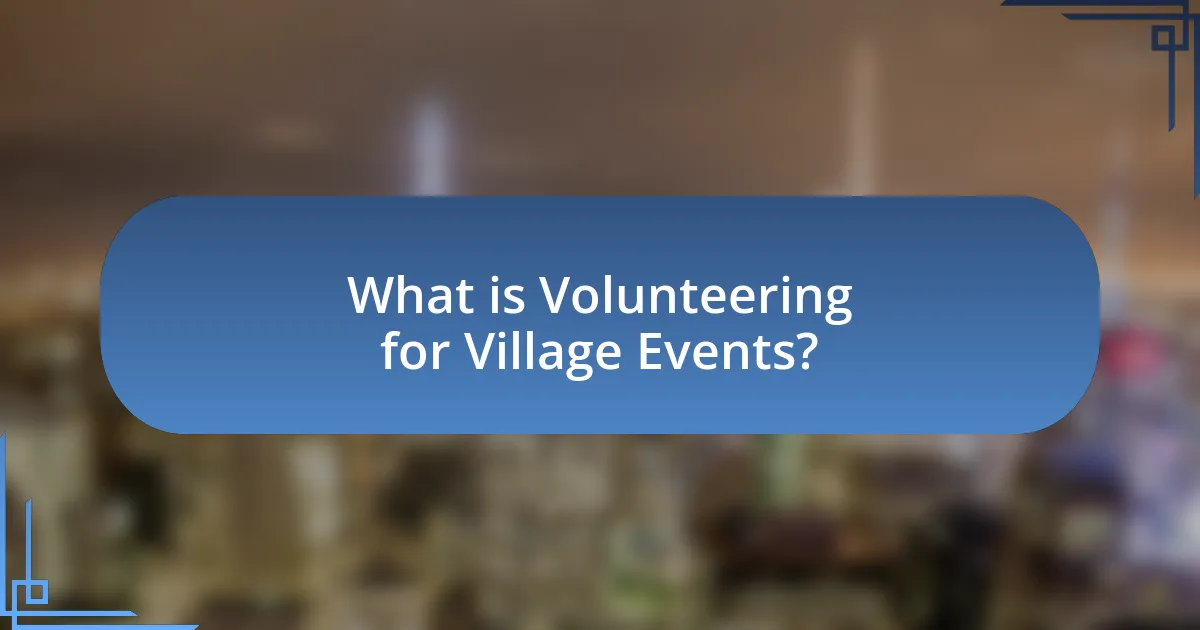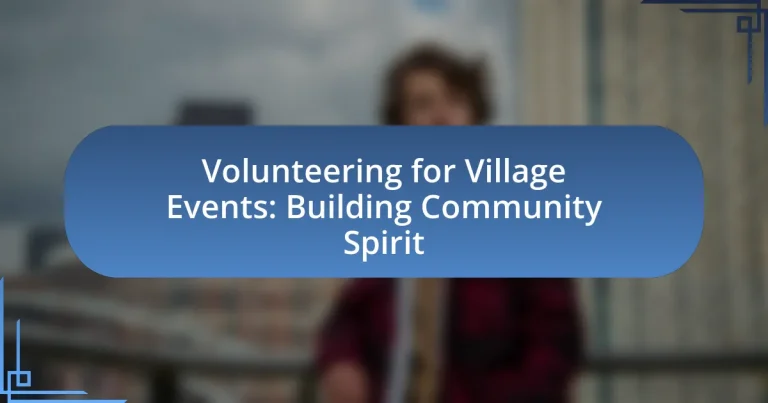Volunteering for village events is a crucial aspect of community engagement, where individuals contribute their time and skills to enhance local activities and foster social cohesion. This article explores the significance of volunteering in strengthening community ties, the various roles volunteers undertake during events, and the positive impact on both individual well-being and community satisfaction. It also addresses the challenges volunteers may face, strategies to overcome these obstacles, and the support systems available to them. Additionally, the article outlines how individuals can get involved in volunteering and best practices for ensuring a successful and fulfilling experience for all participants.

What is Volunteering for Village Events?
Volunteering for village events involves individuals offering their time and skills to assist in organizing and executing community activities. This participation fosters community spirit by bringing residents together to collaborate on projects that enhance local culture and social cohesion. Research indicates that community engagement through volunteering can lead to increased social ties and improved well-being among participants, as evidenced by studies showing that volunteers report higher levels of life satisfaction and community connection.
Why is volunteering important for village events?
Volunteering is important for village events because it fosters community engagement and strengthens social ties among residents. When individuals volunteer, they contribute their time and skills, which enhances the overall success of the event and promotes a sense of belonging. Research indicates that communities with high volunteer participation experience increased social cohesion and improved local relationships, leading to a more vibrant and supportive environment. For instance, a study by the Corporation for National and Community Service found that volunteering can lead to a 20% increase in community satisfaction and a stronger sense of community identity.
What roles do volunteers typically take on during village events?
Volunteers typically take on roles such as event planning, setup and teardown, registration, and providing assistance during activities at village events. These responsibilities are crucial for ensuring the smooth operation of events, as volunteers help coordinate logistics, manage participant engagement, and facilitate activities. For instance, during a village fair, volunteers may set up booths, manage food stalls, or guide attendees, which enhances community interaction and fosters a sense of belonging.
How do volunteers contribute to the success of these events?
Volunteers significantly enhance the success of village events by providing essential support in various roles, such as organizing, managing logistics, and engaging with attendees. Their involvement ensures that events run smoothly, as they often handle tasks like setting up venues, coordinating activities, and assisting with crowd management. Research indicates that events with active volunteer participation tend to have higher attendance rates and greater community engagement, as volunteers foster a welcoming atmosphere and encourage local involvement. For instance, a study by the National Conference on Citizenship found that communities with strong volunteer networks experience increased social cohesion and participation in civic activities, directly correlating to the success of local events.
What types of village events benefit from volunteering?
Village events that benefit from volunteering include festivals, community clean-up days, agricultural fairs, and local sports events. These events rely on volunteers for organization, setup, and execution, which enhances community engagement and reduces costs. For instance, a study by the National Council for Voluntary Organizations found that volunteer involvement in community festivals can increase attendance by up to 30%, demonstrating the significant impact of volunteer efforts on event success.
How do cultural events engage volunteers?
Cultural events engage volunteers by providing them with opportunities to contribute to their community while fostering a sense of belonging and purpose. Volunteers participate in various roles, such as organizing, promoting, and executing events, which enhances their skills and builds social connections. Research indicates that community involvement through cultural events can lead to increased civic engagement and personal satisfaction, as evidenced by a study from the National Endowment for the Arts, which found that individuals who volunteer for arts and cultural activities report higher levels of community attachment and personal well-being.
What are the key volunteer roles in sports events?
Key volunteer roles in sports events include event coordinators, registration staff, scorekeepers, marshals, and hospitality volunteers. Event coordinators oversee the overall planning and execution of the event, ensuring all logistics are in place. Registration staff manage participant sign-ups and provide necessary materials, while scorekeepers track scores and results during competitions. Marshals guide participants and spectators, maintaining safety and order, and hospitality volunteers assist with food, beverages, and accommodations for athletes and guests. These roles are essential for the smooth operation of sports events, contributing to a positive experience for all involved.
How does volunteering foster community spirit?
Volunteering fosters community spirit by encouraging collaboration and connection among residents. When individuals engage in volunteer activities, they work together towards common goals, which strengthens relationships and builds trust within the community. Research from the Corporation for National and Community Service indicates that communities with higher volunteer rates experience increased social cohesion and a greater sense of belonging among residents. This collective effort not only addresses local needs but also enhances the overall quality of life, creating a vibrant and supportive environment.
What social benefits arise from volunteering in village events?
Volunteering in village events fosters community cohesion and enhances social networks. This engagement allows individuals to connect with their neighbors, leading to stronger relationships and a sense of belonging. Research indicates that communities with high volunteer participation experience increased trust among residents and improved overall well-being. For instance, a study published in the Journal of Community Psychology found that volunteerism is linked to higher levels of social capital, which is essential for community resilience and collective action.
How does volunteering strengthen local relationships?
Volunteering strengthens local relationships by fostering connections among community members through shared goals and collaborative efforts. When individuals engage in volunteer activities, they work together to address local needs, which enhances trust and camaraderie. Research indicates that communities with high volunteer engagement report stronger social ties and increased civic participation, as seen in the 2018 study by the Corporation for National and Community Service, which found that volunteers are more likely to feel a sense of belonging and community attachment. This collaborative environment not only builds friendships but also encourages a culture of support and mutual respect, further solidifying local relationships.
What challenges do volunteers face in village events?
Volunteers face several challenges in village events, including limited resources, lack of coordination, and varying levels of commitment among participants. Limited resources often result in insufficient funding, materials, or manpower, which can hinder the successful execution of events. Lack of coordination among volunteers can lead to confusion regarding roles and responsibilities, ultimately affecting the event’s organization. Additionally, varying levels of commitment can create disparities in effort and engagement, making it difficult to maintain a cohesive team dynamic. These challenges can significantly impact the overall effectiveness and enjoyment of village events.
How can volunteers overcome common obstacles?
Volunteers can overcome common obstacles by establishing clear communication and setting realistic expectations. Effective communication ensures that volunteers understand their roles and responsibilities, which reduces confusion and enhances collaboration. For instance, a study by the National Volunteer Center found that organizations with structured communication strategies saw a 30% increase in volunteer retention rates. Additionally, setting achievable goals helps volunteers manage their time and resources effectively, preventing burnout and frustration. By fostering a supportive environment and providing necessary training, volunteers can navigate challenges more successfully, ultimately contributing to the success of village events and strengthening community spirit.
What support systems are available for volunteers?
Support systems available for volunteers include training programs, mentorship opportunities, and access to resources such as materials and supplies. Training programs equip volunteers with necessary skills and knowledge, while mentorship connects them with experienced individuals who provide guidance and support. Additionally, organizations often offer resources like toolkits, informational sessions, and networking events to enhance the volunteer experience and ensure effective participation in community events. These support systems are crucial for fostering a positive environment and encouraging volunteer engagement in village events.
How can individuals get involved in volunteering for village events?
Individuals can get involved in volunteering for village events by contacting local community organizations or event coordinators. Many villages have dedicated committees or groups that organize events and actively seek volunteers. For example, individuals can check community bulletin boards, social media pages, or local government websites for announcements about upcoming events and volunteer opportunities. Engaging with these platforms often leads to direct communication with organizers, who can provide specific roles and responsibilities for volunteers. Additionally, participating in community meetings can help individuals learn about future events and express their interest in volunteering.
What are the steps to find volunteer opportunities?
To find volunteer opportunities, start by identifying your interests and skills, which will help you target organizations that align with your passions. Next, research local nonprofits, community centers, and online platforms like VolunteerMatch or Idealist, which list various volunteer roles. After that, reach out to these organizations directly to inquire about available positions and application processes. Finally, attend community events or meetings to network with other volunteers and learn about additional opportunities. This structured approach ensures you find suitable volunteer roles that contribute to community spirit effectively.
How can volunteers prepare for their roles effectively?
Volunteers can prepare for their roles effectively by understanding their responsibilities and familiarizing themselves with the event’s objectives. This preparation includes attending training sessions, reviewing relevant materials, and communicating with event coordinators to clarify expectations. Research indicates that volunteers who engage in pre-event training are 30% more likely to perform their tasks successfully, as they feel more confident and informed about their roles. Additionally, establishing a support network among fellow volunteers can enhance collaboration and problem-solving during the event.
What are best practices for successful volunteering in village events?
Successful volunteering in village events requires clear communication, active participation, and a commitment to community needs. Volunteers should engage with event organizers to understand their roles and responsibilities, ensuring alignment with the event’s goals. Active participation involves not only fulfilling assigned tasks but also being proactive in offering assistance where needed, which fosters teamwork and enhances the event’s success. Additionally, volunteers should be adaptable and open to feedback, as this flexibility can improve the overall experience for both volunteers and attendees. Research indicates that effective communication and collaboration among volunteers significantly increase event satisfaction and community engagement, as seen in studies conducted by the National Volunteer Center.
How can volunteers ensure a positive experience for themselves and others?
Volunteers can ensure a positive experience for themselves and others by actively engaging in effective communication and collaboration. Effective communication fosters understanding and builds relationships among volunteers and community members, which is essential for a successful event. Collaboration allows volunteers to share responsibilities, reducing individual stress and enhancing teamwork, leading to a more enjoyable experience. Research indicates that strong team dynamics can improve volunteer satisfaction and retention rates, as seen in studies conducted by the Corporation for National and Community Service, which found that volunteers who feel connected to their team are more likely to report positive experiences.
What tips can enhance teamwork among volunteers?
To enhance teamwork among volunteers, clear communication is essential. Establishing open lines of communication allows volunteers to share ideas, ask questions, and provide feedback, which fosters collaboration. Research indicates that teams with effective communication are 25% more productive, as they can coordinate efforts and resolve conflicts more efficiently. Additionally, setting defined roles and responsibilities helps volunteers understand their contributions, leading to increased accountability and motivation. A study by the Project Management Institute found that clearly defined roles can improve team performance by up to 30%. Regular team-building activities also strengthen relationships and trust among volunteers, which is crucial for effective teamwork.


